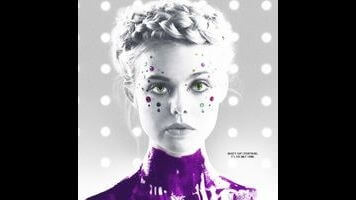Ever heard the one about the girl eaten alive by showbiz? That’s the meat, more fetid than fresh, that Nicolas Winding Refn tears his teeth into with The Neon Demon, which gives a deep-red (and Deep Red) paint job to the most moribund of cautionary tales: the rise and fall of a bright-eyed ingenue. Last time the Danish director shot a movie in Los Angeles, he made dream-pop noir from the minimalist crime sagas of Michael Mann and Walter Hill. Returning to the nocturnal cityscape of Drive, Refn perverts All About Eve into a baroque death reverie—bathing the fashion industry in harsh pools of giallo light, slowing time to a hypnotic crawl, chopping away all but the faintest traces of plot. Style doesn’t triumph over substance in The Neon Demon. It devours it.
The story is so simple, it could be splashed across a billboard: Jesse (Elle Fanning), fresh off the bus from nowhere, is 16 masquerading as 19, because—as explained by a modeling-agency madam (Christina Hendricks, in a one-scene cameo)—“18 is too on the nose.” A beacon of pale and virginal beauty, unsullied by plastic revisions, Jesse is also a Black Dahlia waiting to happen. The opening scene stretches her lithe, seemingly lifeless body across a love seat, blood pooling on the cushions and floor, until the camera pulls back and back and further back to reveal another camera, snapping pictures. Is this red herring (big emphasis on the red) an omen of carnage to come?
A covetous coven closes in, “bionic women” circling like hungry ravens. Makeup artist Ruby (Jena Malone) has a plainly sapphic interest. Models Sarah (Abbey Lee) and Gigi (Bella Heathcote) just see the gigs they’re losing. As if the vampiric dimension weren’t obvious enough, these ruthless gals messily smear their mouths with lipstick (speaking of “on the nose,” one brand is called Redrum), tongue Jesse’s hand wound, and crave the attention of a photographer—bald with sunken features, the Nosferatu of Beverly Hills—who sniffs his subjects’ throats before slathering them in body paint. “Are you food or are you sex?,” one of the women asks Jesse, which puts a pretty fine point on the matter. So does the fact that the only fucking involves a cadaver.
To say that everyone in The Neon Demon is some kind of ravenous creature of the night is mostly accurate, except that “everyone” doesn’t describe many. Refn’s fairy-tale L.A. is so depopulated that it makes Terrence Malick’s version of the city in Knight Of Cups look bustling. The metropolis is less small world than ghost town, and the filmmaker creeps his camera like a phantom through enormous, bare, brightly lit studios; deserted bars with empty booths (one guess on the color scheme); and a swimming pool drained dry, like a luxury crypt. When the soundtrack isn’t jingling with the cell-phone synth of Cliff Martinez’s tangerine nightmare score, a cavernous hush envelops the characters: no walla, no street sounds, no room tone—just robotic, unaffected dialogue (“I think you’re perfect. I would never say you’re fat.”) that plays like an arch parody of cutthroat Hollywood talk. Even the runway shows are deprivation chambers, as Jesse moves through an abyss of darkness, illuminated by strobe-light flashes of red or white, performing for an audience of none.
Refn’s built a career on the exploits of violent men—of underworld hustlers, vicious convicts, and Viking warriors. He pivots here to a feminine perspective but only abstractly: This is a film about objectification that mainly sees its characters as objects, to be dressed and undressed, plastered in glitter and gore, and arranged like furniture against vast expanses of negative space. The Neon Demon is more significant for how it fits into Refn’s ongoing transformation from fighter to lover, from purveyor of scuzzy shocks to master of mesmerizing mood. To a possibly greater extent than Drive, it’s a genre pastiche that delays its thrills for as long as possible, preferring instead to linger on the dreamy spectacle of Jesse dancing against the L.A. skyline for an audience-surrogate shutterbug (Karl Glusman, our off-brand Rami Malek). When the film finally reaches a crimson peak of climactic mayhem, Refn still seems more concerned with sustaining the atmosphere than delivering the grisly goods.
All of this might be a gorgeous bore, à la the similarly languid Only God Forgives, if it weren’t perched on the edge of black comedy—a cliff it slips straight off of whenever Keanu Reeves, as a shady motel manager, shows up to break the art-horror spell. But without the winks of awareness, The Neon Demon would still drown eyeballs in opulence and get audiences stoned on its aura of drowsy menace. When Jesse is cowering in her drab, dingy roadside digs, there are even a few alluring shades of Mulholland Dr., another film that sees Los Angeles as a seductive beast, sucking starlets in, then sucking the life out of them. But if David Lynch obfuscated his lament for Hollywood’s lost souls with rabbit-hole dream logic, Refn would have to write in, well, neon letters to be clearer on his big message. The Neon Demon skewers the beauty business in its own language, building a catwalk straight to hell.


 Keep scrolling for more great stories from A.V. Club.
Keep scrolling for more great stories from A.V. Club.